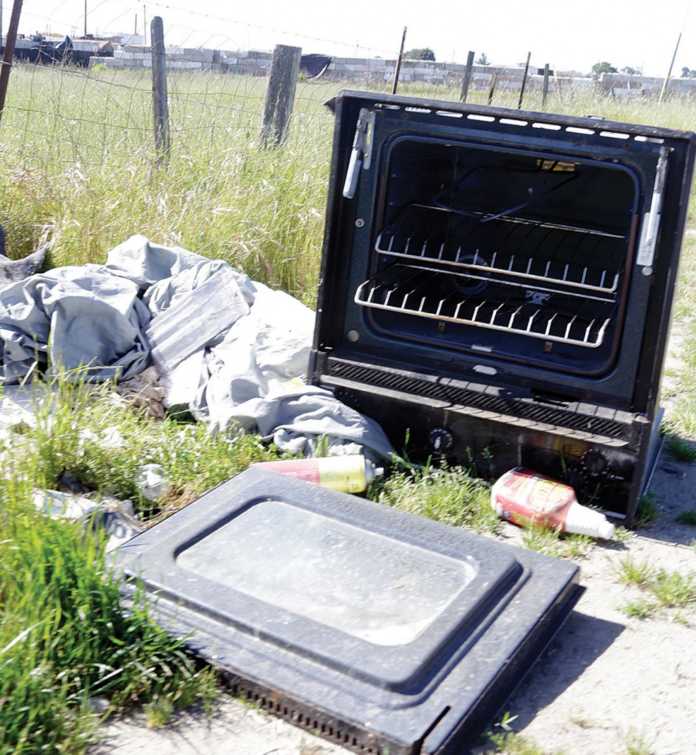Editor’s note: This is the first of a two-part series about illegal dumping in the Pajaro Valley.
WATSONVILLE — Public Works Administrative Services Manager for the City of Watsonville Gabriel Gordo is constantly amazed at what gets dumped into the streets and waterways of the place he calls home.
From mattresses and sofas to stoves and televisions, there doesn’t seem to be a limit to what Gordo and his team regularly find.
“It’s a challenge,” Gordo said. “We do our best to catch everything, but it just keeps coming.”
On a warm Monday morning in mid-July, Utility Workers Sal Lopez and Rudy Zaragoza hopped into a truck on a mission to recover as much waste as they could. They focused on what they dubbed “hot spots”: nooks and crannies of the city that are most susceptible to illegal dumping.
“You see it all,” Zaragoza said. “I have a TV in the back of the truck right now that I picked up from a gutter this morning. There’s needles, jugs of motor oil, condoms. It’s crazy.”
Gordo said the team recovers roughly 1,100 yards of material per year—the length of 11 football fields. Six full-time employees divided into three teams patrol the city and surrounding areas. They handle property maintenance, homeless encampments, report shopping carts and more, from the Pajaro River to the Santa Cruz Mountains.
The items then get transferred to Watsonville’s Municipal Services Center on Harvest Drive—a facility that is open to the public for use. The center takes in nearly every type of solid waste, much of it for free.
“Things like appliances can be dropped off completely free of charge,” Gordo said. “I don’t think people know that. We’re right in town. It’s so easy for people to drop by without even leaving city limits.”
Communication is a big challenge facing the facility, led by the Solid Waste Division of the Public Works & Utilities Department. Despite being open since 2000, it goes unnoticed by many. The department struggles with illegal dumping in every corner of the valley—leading them to believe a big part of it is public awareness.
The City of Watsonville offers field trips for students to landfills and water treatment plants—and by extension tries to educate parents. Monthly levee cleanups with volunteer groups are organized. They also send out pamphlets about the Municipal Services Center to residents, but Lopez guesses plenty might be thrown out, mistaken for junk mail.
“The city tries to reach out,” Lopez said. “But there’s something missing. Maybe people came from a community that didn’t offer any services. Whatever the reason, more needs to be done.”
The team pointed out the environmental impacts of dumping during a quick stop at a dumpsite near Kearney Street.
“Look, there is a storm drain right there,” Gordo said. “This is stormwater 101—if this stuff sits here, and all these sediments, solids, chemicals… if it rains, all that is going to be released into the environment. This is the first line of defense.”
Lopez said he understands that people are worried about expenses.
“We understand that money is an issue,” he said. “But others just don’t seem to care. They’ll just dump things without checking for other options.”
Zaragoza agreed.
“Our facility is just around the corner—five minutes away,” Zaragoza said. “But there’s always stuff left here. It doesn’t make sense.”

Rudy Zaragoza, Sal Lopez and Gabriel Gordo discuss illegal dumping in Watsonville during a routine checkup of the Pajaro River. — Johanna Miller/The Pajaronian
The utility team breaks the work week up into focus areas. Wednesdays they are at the Pajaro River. Fridays they sweep through alleyways. And on Tuesdays and Thursdays, they focus on homeless encampments.
“That’s another part of the job,” Gordo said. “We deal with social issues—the team has received training on how to work with the homeless.”
Added Lopez: “I know some of them. I went to school with some of them. Most are good people. Others don’t want help and don’t care—but the same could be said about people who have roofs over their heads.”
Last year, the city and other volunteers participated in a large cleanup around Highway 1 near Big Creek Lumber. Three to four large dumpsters were filled. The cleanup utilized new equipment that the department has gradually been able to purchase, including pulley systems that help dislodge waste from deep in mud. It helped with the process and kept workers safe, Gordo said.
But resources are still limited, and Lopez said the issue won’t resolve if the community doesn’t get involved.
“You need to care,” Lopez said. “This is your home. Be proactive in keeping it healthy.”
Gordo expressed his frustration in how continual the issue is.
“It feels like we’re subsidizing them, allowing them to keep doing this because we clean it up,” he said. “But we don’t want to live in a filthy town, either.”
Added Zaragoza: “The more people see it happen, the more it gets normalized. It becomes a pattern. We need to break that pattern.”
The team asks that residents report any illegal dumping activity. Even if they don’t witness it—call in waste as soon as possible.
Also, the department urges the community to utilize what the Municipal Services Center offers—including their free subscription service for yard waste and the drop-off center.
“Our job is not to make lots of money,” Gordo said. “Our mission is to help. We only ask for help in return.”
The Municipal Service Center is located at 320 Harvest Drive and is open Monday-Friday, 8 a.m.-4:30 p.m. For information visit cityofwatsonville.org or call 768-3133.
•••
In the next part of this series, we will chat with water resource experts and learn more about the environmental impacts of illegal dumping into the city’s sloughs and rivers.













